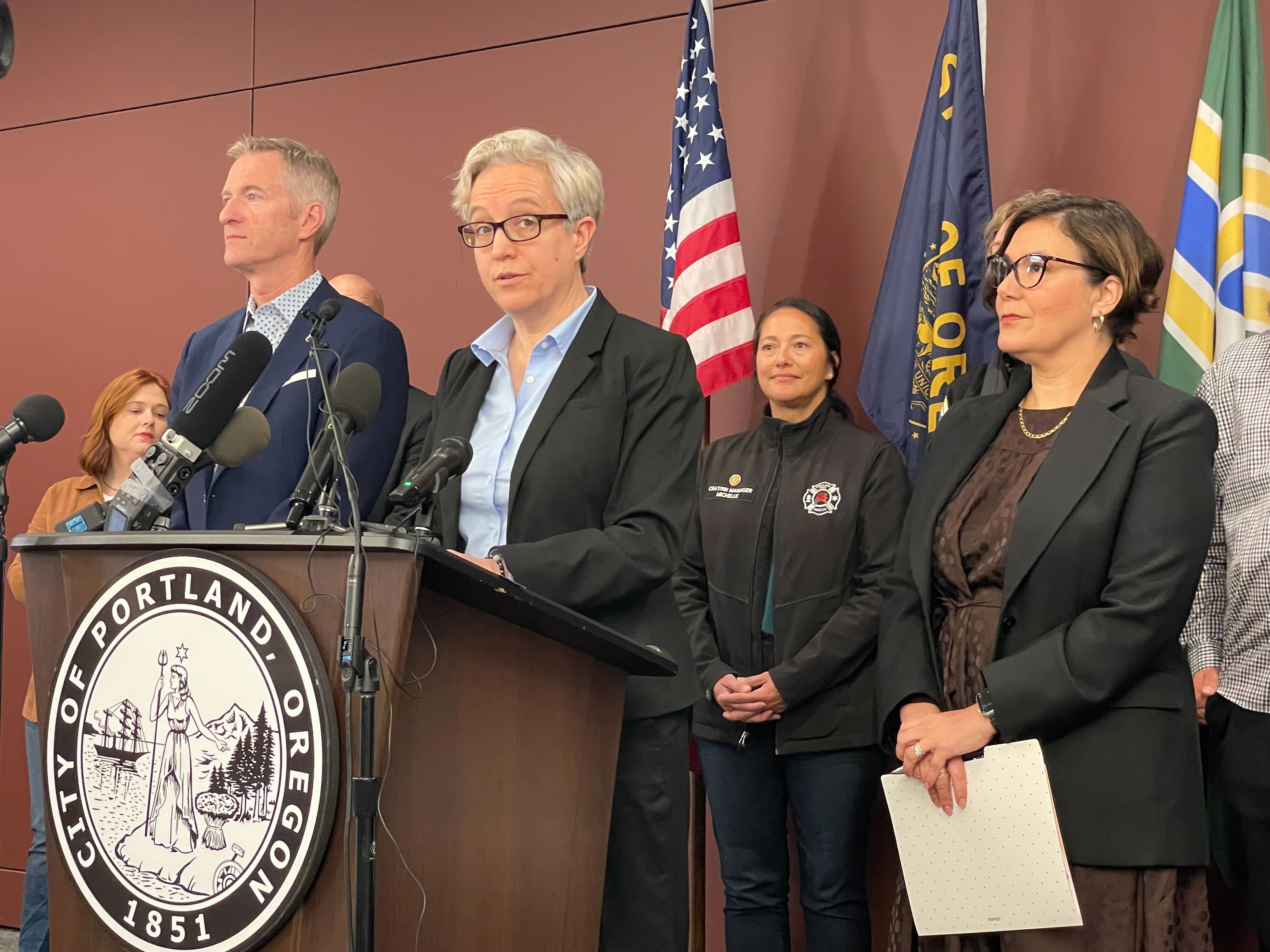
(Front, from left to right) Portland Mayor Ted Wheeler, Oregon Gov. Tina Kotek and Multnomah County Chair Jessica Vega Pederson speak to mark the end of Portland's 90-day state of emergency in Portland, Ore., on May 3, 2024.
Bryce Dole / OPB
Portland made national headlines in January when Oregon Gov. Tina Kotek and local leaders declared a 90-day state of emergency in response to the fentanyl crisis that roiled the city.
Those three months ended this week. Locals and officials are split on how much was accomplished, and many are wondering what’s next.
In a Friday press conference in downtown Portland, Kotek, Mayor Ted Wheeler and Multnomah County Chair Jessica Vega Pederson touted their efforts during the state of emergency, saying officials improved coordination and outreach, connected more people with treatment and housing and cracked down on drug dealing.
“It’s gratifying to report overall that this work has resulted in Portland trending in what I believe is the right direction,” Wheeler said, noting that crime has decreased in the city.
Not everyone agrees that notable progress has been made during the state of emergency.
“Absolutely nothing has changed,” said Jessie Burke, who owns a boutique hotel and chairs a community association in Portland’s Old Town, a neighborhood that has been hit especially hard by the fentanyl crisis. Burke is also running for the Multnomah County commissioner.
Progress made, but more work to be done
During the state of emergency, officials made nearly 80 referrals to treatment or detox, 300 referrals to shelters and 30 referrals to housing programs, Vega Pederson said in the press conference. She added that the county has created dashboards to map where overdoses are occurring, expanded peer outreach programs, improved access to Narcan — a medication that reverses an overdose — and launched a campaign focused on preventing drug use among youths.
“We’re pleased to stand before you today to say that important progress has been made,” Vega Pederson said.
Still, officials say they are looking to expand similar efforts in other areas, including east Multnomah County. Vega Pederson said she is seeking to improve wages among health and human service contractors and increase mobile clinics offering treatment.
For now, Kotek said she had directed the Oregon State Police to extend their work in Portland for another six months to work with city police and assist with outreach.
“There’s more work to be done,” Kotek said. “We all know that. And I want you to know that the state will continue to be a key partner in the work here in Portland.”
Meanwhile, overdoses continue to plague the county. Over the past three months, at least 201 people are suspected of having died from an overdose in Multnomah County, six fewer than the three months before, according to data from the Multnomah County Medical Examiner.
The monthly average number of deaths during the state of emergency — 67 — was two higher than the monthly average for all of 2023.
Related: In downtown Portland’s fentanyl crisis, Oregon leaders declare emergency
Multnomah County Commissioner Sharon Meieran said she has been frustrated by what she describes as meager accomplishments during the state of emergency.
“I feel appalled and dismayed and frustrated, but I wish I could say surprised,” said Meieran, who added: “Meanwhile, people are dying of overdoses in increasing numbers and I have yet to see any sense of urgency around this issue or a plan.”
Meieran, an emergency medicine physician whose term on the county board ends this year, questioned why such efforts weren’t happening before a state of emergency. “I thought that could’ve, should’ve and would’ve been happening without the 90-day emergency declaration,” she said.
Asked why such efforts hadn’t been made sooner, Kotek explained the influx of fentanyl worsened as Oregon emerged from the pandemic, and said it was a crisis “that I don’t think any of us could have anticipated.” She said the state of emergency allowed work to occur faster than it otherwise would.
Concerns from Old Town businesses
Some business owners and employees in Portland’s Old Town Chinatown say that things have improved in recent months, with fewer groups of people visibly using and dealing drugs in the area. Few knew the city was in a formal state of emergency.
“It does seem like it’s been a little more calm on the streets,” said Kurt McCanles, co-manager of the Cycle Portland bike shop.
Fabian Rosas, owner of Fabo’s Tacos along the transit mall on Northwest 5th Avenue, said he’s seen significant improvements around his business and attributed those changes to the work he’s seen from Portland Police Bureau bicycle patrol squad.
“Before, you could not even walk around,” he said.

FILE - A Portland police central bike squad officer issues a citation for drug possession in the city’s Old Town neighborhood in downtown Portland, Ore., Nov. 15, 2023, along with a card with the phone number for treatment information.
Kristyna Wentz-Graff / OPB
Still, many say they have to contend with the crisis on a near daily basis. Victoria Liano, a barista at Café UNITED, says it’s normal for her to see people around Old Town taking their clothes off, hunched over, falling asleep with sores covering their body. She says people ask her about fentanyl — whether she has some or wants some — at the bus station during her commute.
“It’s really sad,” she said. “I wish there was more I could do.”
But Liano said she isn’t concerned for her safety while working in Old Town. “I’m more worried for their safety,” she said.
Related: Oregon Gov. Tina Kotek indicates she would sign a bill recriminalizing drug possession
Carmen BaLova, the project sales manager for Orox Leather Co. not far from the taco restaurant, says she has called security at least three times in the past week because of people using drugs directly outside her store.
“I don’t really see any police presence in our area,” she said.
Some business owners say they still struggle to retain staff due to concerns over how fentanyl has affected the area. BaLova says she has considered moving her business elsewhere but would only do that as a last resort.
“We believe in Chinatown,” she said. “But we can only believe in it for so long.”


